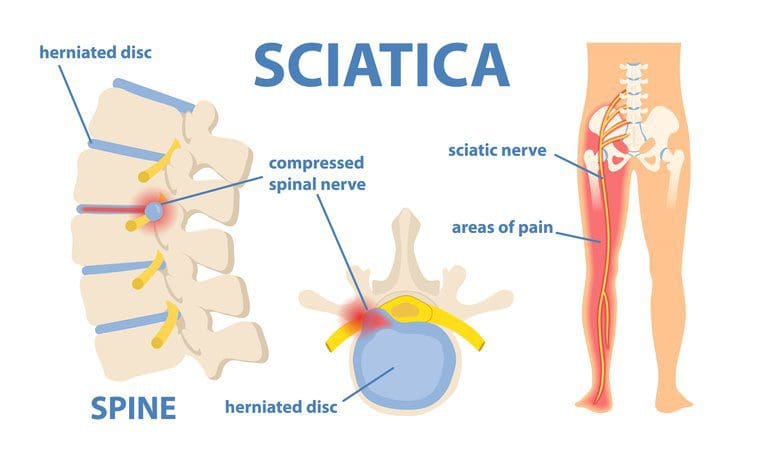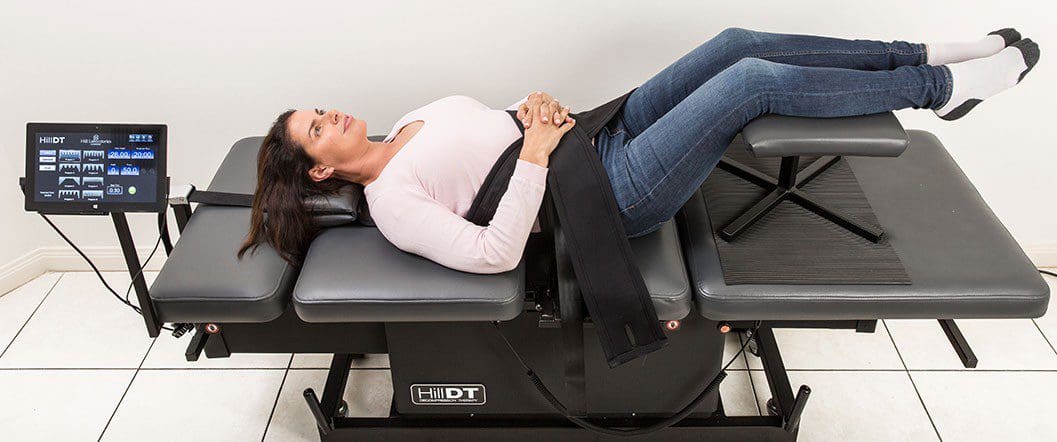Introduction
The spine makes sure that the body is staying upright while making sure that it stands, twists, bends, and turns without feeling any sort of pain. However, as the body begins to naturally age, so does the spine as the spinal discs begin to start wear and tear causing unwanted back issues that will affect a person’s quality of life. Luckily there are treatments that help alleviate back pain issues and can help restore the spine back to its original function. In this article, we will be taking a look at what is sciatica, the symptoms it causes to a person, and how decompression therapy can help alleviate sciatica symptoms. By referring patients to qualified and skilled providers specializing in spinal decompression therapy. To that end, and when appropriate, we advise our patients to refer to our associated medical providers based on their examination. We find that education is the key to asking valuable questions to our providers. Dr. Alex Jimenez DC provides this information as an educational service only. Disclaimer
Can my insurance cover it? Yes, it may. If you are uncertain, here is the link to all the insurance providers we cover. If you have any questions, please call Dr. Jimenez at 915-850-0900.
What Is Sciatica?
Since the spine is encompassed by ligaments, the spinal cord, soft tissues, and trillions of nerves spread out throughout the entire body, these nerves ensure that the sensations are being felt when a person is feeling something they are touching or feeling impacted on. When the body begins to feel pain and starts to affect the nerves, it can send a sharp shooting pain that can cause a person to feel weakness in the leg muscles, known as sciatica. Research studies have shown that sciatica radiates pain along the sciatic nerve that travels down from the lower back to the leg. Sciatica usually occurs when the spine is suffering from a herniated disc, and that affected disc is touching the sciatic nerve causing sharp shooting pain down the leg.
Other research studies have found that when individuals describe how sciatica pain feels, there are many different ways to express it depending on the cause and how severe the pain is. Sometimes the pain would often be described as sharp, shooting pain that goes down on one leg or as excruciating burning pain that either comes or goes or even may be constant. Sciatica can also come suddenly or gradually on the leg when the sciatic nerve has been pinched.
What Are The Symptoms?
Research studies have shown that sciatica symptoms can range from being infrequent and irritating to severe and debilitating. Since the sciatic nerve root is compressed or pinched, the symptoms can affect the specific spinal nerve root originating from the sciatic nerve. Some of the common symptoms that are caused by sciatica usually involve one leg at a time and are seen as:
- Pain that is shooting down the leg
- Numbness or tingling sensation that is felt in the back of the leg
- Muscle weakness that is in the leg and foot
- Posture change can alleviate or aggravate the pain
Treating Sciatica With Decompression-Video
The video above shows where the sciatic nerve is and how sciatica affects the leg. One of the many treatments that can alleviate sciatica nerve pain is spinal decompression therapy. Spinal decompression allows the spine to be gently pulled by traction, causing instant relief to the individual. Spinal decompression therapy also allows the beneficial nutrients to enter the spinal cord and increases the disc height on the spine. Since a herniated disc causes sciatica, spinal decompression allows the herniated disc, which affects the sciatic nerve, to retreat to the spine before it was herniated. This will cause instant relief to the individual that was affected by sciatica, and they can start on their wellness journey pain-free. If you want to learn more about spinal decompression therapy, this link will explain the benefits of spinal decompression and how it can alleviate low back pain symptoms.
Utilizing Decompression Therapy For Sciatica
With sciatica causing many individuals pain, many treatments are utilized to alleviate sciatica nerve pain and dampen the inflammatory effects it has caused. Research studies have found that non-surgical spinal decompression therapy is used to reduce low back pain and pain associated with sciatica and increase disc height in the spine. When individuals are lying down on the decompression table, they are strapped in. The machine allows the spine to be gently stretched out through traction, causing instant relief to the individual. Other research studies have shown that decompression therapy allows the decompression machine to effectively stretch the spine gently that has been suffering from back issues like sciatica, herniated discs, and low back pain. This gentle stretch allows the herniated disc to stop pressing on the sciatic nerve and causes relief to the individual.
Conclusion
The spine is encompassed by ligaments, the spinal cord, soft tissues, and nerves that help protect the spine from injury. However, when the spine does get injured, it can cause the spinal disc to bulge out or herniate and touch the sciatic nerve to cause immense shooting pain down the leg. This is known as sciatica, and it can cause a person to have immense shooting sharp pain that can affect a person’s quality of life. Treatments like decompression therapy allow the individuals suffering from sciatica to feel instant relief as their compressed spine is being gently pulled and causing the herniated disc to stop touching the sciatic nerve. Combined with physical therapy, spinal decompression allows the individual to be pain-free from sciatica and will enable them to continue their wellness journey.
References
Apfel, Christian C, et al. “Restoration of Disk Height through Non-Surgical Spinal Decompression Is Associated with Decreased Discogenic Low Back Pain: A Retrospective Cohort Study.” BMC Musculoskeletal Disorders, U.S. National Library of Medicine, 8 July 2010, https://pubmed.ncbi.nlm.nih.gov/20615252/.
Hochschuler, Stephen. “Sciatica Symptoms.” Spine, Spine-Health, 5 June 2019, https://www.spine-health.com/conditions/sciatica/sciatica-symptoms.
Kang, Jeong-Il, et al. “Effect of Spinal Decompression on the Lumbar Muscle Activity and Disk Height in Patients with Herniated Intervertebral Disk.” Journal of Physical Therapy Science, The Society of Physical Therapy Science, Nov. 2016, https://www.ncbi.nlm.nih.gov/pmc/articles/PMC5140813/.
Medical Professionals, Cleveland Clinic. “Sciatica: Causes, Symptoms, Treatment, Prevention & Pain Relief.” Cleveland Clinic, 25 Mar. 2020, https://my.clevelandclinic.org/health/diseases/12792-sciatica.
Staff, Mayo Clinic. “Sciatica.” Mayo Clinic, Mayo Foundation for Medical Education and Research, 1 Aug. 2020, https://www.mayoclinic.org/diseases-conditions/sciatica/symptoms-causes/syc-20377435.
Disclaimer
Post Disclaimer *
Professional Scope of Practice *
The information herein on "The Outcome Of Sciatica After Decompression Therapy" is not intended to replace a one-on-one relationship with a qualified health care professional or licensed physician and is not medical advice. We encourage you to make healthcare decisions based on your research and partnership with a qualified healthcare professional.
Blog Information & Scope Discussions
Welcome to El Paso's Premier Fitness, Injury Care Clinic & Wellness Blog, where Dr. Alex Jimenez, DC, FNP-C, a Multi-State board-certified Family Practice Nurse Practitioner (FNP-BC) and Chiropractor (DC), presents insights on how our multidisciplinary team is dedicated to holistic healing and personalized care. Our practice aligns with evidence-based treatment protocols inspired by integrative medicine principles, similar to those found on this site and our family practice-based chiromed.com site, focusing on restoring health naturally for patients of all ages.
Our areas of multidisciplinary practice include Wellness & Nutrition, Chronic Pain, Personal Injury, Auto Accident Care, Work Injuries, Back Injury, Low Back Pain, Neck Pain, Migraine Headaches, Sports Injuries, Severe Sciatica, Scoliosis, Complex Herniated Discs, Fibromyalgia, Chronic Pain, Complex Injuries, Stress Management, Functional Medicine Treatments, and in-scope care protocols.
Our information scope is multidisciplinary, focusing on musculoskeletal and physical medicine, wellness, contributing etiological viscerosomatic disturbances within clinical presentations, associated somato-visceral reflex clinical dynamics, subluxation complexes, sensitive health issues, and functional medicine articles, topics, and discussions.
We provide and present clinical collaboration with specialists from various disciplines. Each specialist is governed by their professional scope of practice and their jurisdiction of licensure. We use functional health & wellness protocols to treat and support care for musculoskeletal injuries or disorders.
Our videos, posts, topics, and insights address clinical matters and issues that are directly or indirectly related to our clinical scope of practice.
Our office has made a reasonable effort to provide supportive citations and has identified relevant research studies that support our posts. We provide copies of supporting research studies upon request to regulatory boards and the public.
We understand that we cover matters that require an additional explanation of how they may assist in a particular care plan or treatment protocol; therefore, to discuss the subject matter above further, please feel free to ask Dr. Alex Jimenez, DC, APRN, FNP-BC, or contact us at 915-850-0900.
We are here to help you and your family.
Blessings
Dr. Alex Jimenez DC, MSACP, APRN, FNP-BC*, CCST, IFMCP, CFMP, ATN
email: [email protected]
Multidisciplinary Licensing & Board Certifications:
Licensed as a Doctor of Chiropractic (DC) in Texas & New Mexico*
Texas DC License #: TX5807, Verified: TX5807
New Mexico DC License #: NM-DC2182, Verified: NM-DC2182
Multi-State Advanced Practice Registered Nurse (APRN*) in Texas & Multi-States
Multistate Compact APRN License by Endorsement (42 States)
Texas APRN License #: 1191402, Verified: 1191402 *
Florida APRN License #: 11043890, Verified: APRN11043890 *
Verify Link: Nursys License Verifier
* Prescriptive Authority Authorized
ANCC FNP-BC: Board Certified Nurse Practitioner*
Compact Status: Multi-State License: Authorized to Practice in 40 States*
Graduate with Honors: ICHS: MSN-FNP (Family Nurse Practitioner Program)
Degree Granted. Master's in Family Practice MSN Diploma (Cum Laude)
Dr. Alex Jimenez, DC, APRN, FNP-BC*, CFMP, IFMCP, ATN, CCST
My Digital Business Card
RN: Registered Nurse
APRNP: Advanced Practice Registered Nurse
FNP: Family Practice Specialization
DC: Doctor of Chiropractic
CFMP: Certified Functional Medicine Provider
MSN-FNP: Master of Science in Family Practice Medicine
MSACP: Master of Science in Advanced Clinical Practice
IFMCP: Institute of Functional Medicine
CCST: Certified Chiropractic Spinal Trauma
ATN: Advanced Translational Neutrogenomics





